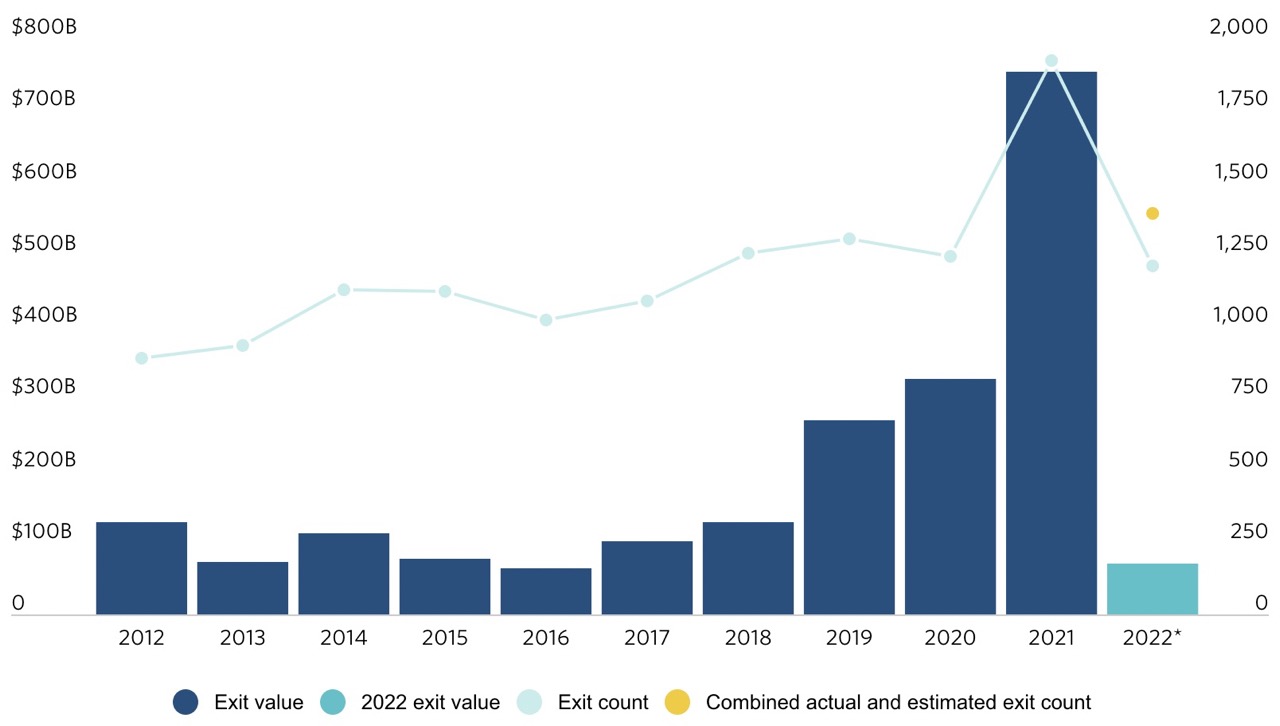
So, how are Europe’s startups doing?
Welcome to Startups Weekly. Sign up here to get it in your inbox every Friday afternoon.
I’ve been keeping an eye on the European startup ecosystem since well before I moved to the U.S., and today’s report from Creandum about the state of venture investing in Europe gave me pause. This, along with PitchBook’s report of what happened across the pond last year, adds up to a complex picture.
As far as I can see — and as I discussed in my column this week — the ecosystem in Europe continues to be pretty fragmented and immature, and investment across the pond took a 16% dip in 2022 compared to 2021. That isn’t unique to Europe, of course; 2022 was hard across the board, and compared to the years before, there were very few liquidity events across the startup world:

Data from PitchBook shows that exit values in 2022 were dismal. Image Credits: PitchBook
All around, 2022 was a dismal year: We haven’t seen this little M&A and IPO activity since 2016. The total value of exits in 2022 was $71 billion. The year before, it was more than ten times that.
Bad years happen, but I’m going to keep a very close eye on how quickly the VC markets bounce back. My suspicion is that the U.S. venture industry is more resilient in the face of a slow year or two and that LPs are less easily spooked. In other words, it’s going to be telling to see who raises new funds, where, and with what investment theses over the next three to five years.
Health tech is sticking its tongue out, saying aaaaaaaaaah

Image Credits: adventtr (opens in a new window) / Getty Images
Spotify co-creator Daniel Ek’s new company raised a $65 million round of funding for his preventative healthcare startup Neko Health — all the more impressive given that this is reportedly the first external round of financing for the Stockholm-based company.
Lightspeed Ventures made its first investment in Africa, backing Berry Health, which aims to bring judgment-free healthcare to a continent where stigma cuts deep and is affecting many.
News of the fresh rounds comes on the heels of a healthy amount of activity in health tech — Public Ventures launched a $100 million impact fund focusing on nascent life science and clean tech startups, particularly in Canada.
Break out the X-ray vision: Ingrid reports that Augmedics snaps up $82.5 million to improve the outcome of spinal surgery using AR and AI.
He loosened his silk rainbow bow tie. Things were about to get spicy . . .: I wrote about how sex toy company Lovense is leaning into the AI craze, using ChatGPT to whisper sweet, customizable fantasies into your ear holes.
A run for your money: Ingrid wrote about Munich-based EGYM, which raised $225 million from Jared Kushner’s Affinity Partners to make the gym smarter and less sucky.
It’s handbags at dawn for social media

Image Credits: Bryce Durbin / TechCrunch
If you’ve stumbled across the TechCrunch homepage in the past week, then you’ve seen our wall of coverage on the utter drama-fest that is the social media landscape at the moment. Investment giant Fidelity already adjusted down its Reddit valuation a month ago, but Manish reports that it further deepened its valuation cuts for Reddit this week, after the Reddit protest plunges user engagement.
If you look beyond the Reddit dumpster fire for a fraction of a second, the rest of social media is aflame as well. Twitter competitors soar after Musk makes another boneheaded move, and Paul argues that its competitors need to get their act together in order to become a true competitor.
Apropos competitors, Meta’s Twitter competitor Threads went live and quickly passed 2 million downloads in just two hours, and more than 30 million in a day. I know, I didn’t really see it coming either, but TechCrunch compiled an all-your-questions-answered article about Threads. My first impression? The app isn’t great, but Instagram’s network effect is formidable, and Twitter has been screwing up so monumentally since Musk’s acquisition that it may just be all it takes to put the bird app in its grave.
That’s a pass from us, mon frère: Natasha L points out that Meta’s Threads app is a privacy nightmare and that it won’t launch in the EU yet. This follows a report that a bunch of tech giants are having to figure out how to respond to the EU’s rebooted antitrust regime.
Money didn’t bring API-ness: Ivan ponders what’s happening over at Reddit as the social media site braces for life after API changes.
Lawsuits from a parallel universe: Devin reports that a Louisiana judge silenced White House social media talks in a lawsuit that seems pretty wild. He writes, “It’s almost pitiable how desperately the lawsuit peddles its conspiracy theories, making out routine emails to be collusion and [the] removal of rule-violating content as censorship.” So . . . that’s fun.
Take down those tweets: While we’re on the topic of wild court cases, Twitter was trying to wriggle out of a case in India, but the judge didn’t mince words: “Punishment for non-compliance is 7 years imprisonment and unlimited fine.” Needless to say, Twitter’s plea against India’s government was dismissed, although the core of the case is still curious: Twitter has been asked to take down hundreds of accounts and tweets, often for denouncing the Indian government.
Skynet awakens

Image Credits: Getty Images / sompong_tom
AI is everywhere, but never has it been so confusingly head scratching as in the case of Humane’s first product: The Ai Pin. The secretive startup has been around since 2018 and has reportedly raised more than $230 million since then — and I can’t for the life of me figure out why this is better than just saying, “Hey, [voice assistant],” into your nearest smart device. Someone, please, explain it to me.
Did I mention that AI is hot? In the past couple of weeks, I had two founders reach out to me for fundraising advice, only to get back to me a couple weeks later with an “lol, I guess we don’t need help; we just got several term sheets.” The right teams are raising formidable amounts of funds as the FOMO sets in among investors. One example is Typeface, which is building generative AI for brands and just announced a $100 million raise at a $1 billion valuation.
On top of that, one of the wilder stories we’ve seen so far was a founder selling its four-month-old “OpenAI for China” play for $234 million. That means the startup gained about $2 million of valuation per day from starting to acquisition. Yowzers.
Incidentally, if someone wants to share some AI-related decks for my Pitch Deck Teardown series, I wouldn’t be mad.
Yes, this is definitely Bobby’s mother. He cannot come to school today: Ingrid reports that Voice.ai raises $6 million as its real-time voice changer approaches 500,000 users.
Hey, robot, you grab the crayons, I’ll make the coffee: Kyle reports that Runway raised $141 million as it builds generative AI tools for content creators.
We can’t measure this, but it’s definitely 10x better: Over on TC+, Software.com co-founders Geoff Stevens and Brett Stevens argue that the productivity boosts developers see by using AI are a bit of smoke and mirrors — not least because nobody seems to agree on how to measure productivity among software developers in the first place.
Top reads on TechCrunch this week
Bad horndog, no porn for you: Amanda reports that Pornhub blocks access in Mississippi, Virginia and Utah amid changing laws related to mandatory age verification for adult sites. Instead of trying to do age verification through checking your government-issued ID as requested by law, Pornhub took a different approach. Go to the site from one of the blocked states, and you’re met with a video where adult performer Cherie DeVille explains why age verification systems are a bad idea.
Working remotely, or not remotely working: On TC+, Becca argues that remote work startups that will last aren’t actually, technically, remote work startups. Instead, companies that focused on remote work are tapping into trends that were already in play, with more autonomy and more flexibility, wherever you are working from.
Taking a bite of the Goldman Delicious apple: Goldman may be “looking for a way out” of its high-profile deal with Apple, which recently expanded to include savings accounts for Apple Card holders, Harri reports.
Slow, slow, then fast: There’s something to be said for laying the groundwork for a company before raising venture capital, but Romain’s report this week is an outlier: After bootstrapping for eight years and growing to $16.4 million of annual revenue, French accounting startup Dougs raised $27 million.
Get your TechCrunch fix IRL. Join us at Disrupt 2023 in San Francisco this September to immerse yourself in all things startup. From headline interviews to intimate roundtables to a jam-packed startup expo floor, there’s something for everyone at Disrupt. Save up to $600 when you buy your pass now through August 11, and save 15% on top of that with promo code STARTUPS. Learn more.



